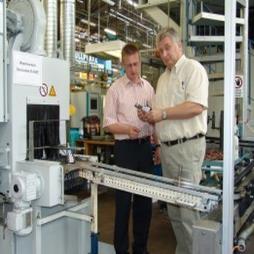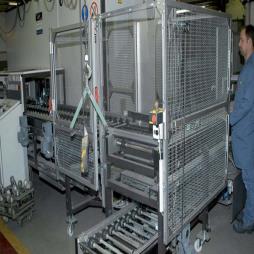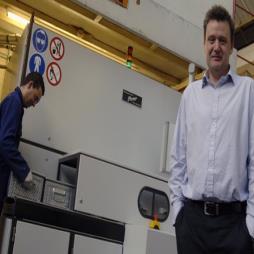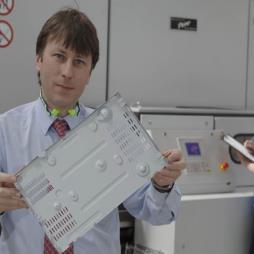GKN select Pero degreaser as supplier of 30 tunnel washing machines
26-03-2015
GKN Driveline Deutschland, Mosel plant Selects Pero compact tunnel wash
Consistency – that is what PERO Degreaser shows once again. At its Gotha plant, the company produces tunnel wash units for production lines. GKN Driveline Deutschland has recently integrated 30 such cleaning machines into its own production lines and installed PERO compact tunnel wash units in production cells of other plants of the GKN group. The compact units are hidden behind the guards of the production cells, and they are hardly visible. Only the exhaust air condenser, which protrudes from the top of the unit like a snorkel, and the clean parts leaving the machine indicate that there is a PERO machine at work.
GKN with Pero tunnel wash machine 2The automotive industry is dominated by one key word: quality. GKN is a leading supplier of drive systems and components for car manufacturers, employing 21,000 people at 49 plants in 31 countries. One such facility is the GKN Mosel plant, where 30 PERO cleaning machines are contributing to the ongoing success of the company. When asked why GKN Driveline chose the PERO solution, Jürgen Abendroth, head of the central engineering department at the Mosel plant had a simple answer, “PERO degreaser offers value for money”’ said the engineer responsible for the planning and implementation of production facilities, products, and mechanical engineering projects.
To be truthful, a number of compact tunnel wash units were installed before the reunification of Germany, when the Mosel and Gotha plants were part of state-run conglomerates. The automotive supplier GKN acquired the Mosel plant in 1991, while PERO took over the Gotha plant in 1993. The two companies continued the close cooperation that they established during the GDR era. “We were delighted to hear that PERO had acquired the Gotha plant, thus continuing the production of compact tunnel wash units,” says Jürgen Abendroth, “as we were very happy with the performance of these machines.” Machines of the KDA series can be easily integrated into any production line and have been specifically designed to cater to many different applications. They are compact in design and suitable for the cleaning, degreasing, rinsing and drying of nearly all types of parts and assemblies. PERO degreaser KDA machines cater to iron phosphating with or without degreasing and de-phosphating. The compact tunnel wash units have been designed for use with alkaline, neutral or slightly acidic cleaning solutions.
The KDA machines feature a modular design, so that they can be easily adapted to suit the requirements of customers. The modules “W” for washing, “S” for rinsing and “T” for drying can be combined in any chosen sequence. “PERO tunnel wash units have one great advantage,” explains the PERO sales engineer, Holger Grams, “as the washing and rinsing modules are always followed by a neutral zone, where any residual liquid is blown off the parts.” This prevents contamination of the rinsing module with the washing medium and also ensures that no drip-dry parts enter the drying module.
“Many of our drive components must be completely free of chips and grease before they can be processed further,” explains Jürgen.
Due to their compact design and excellent cleaning capacity, PERO degreaser – tunnel wash units are the ideal solution for the automotive production lines of car manufacturers and component suppliers alike. At all steps where parts must be clean before they can be processed further, a KDA unit can be integrated into the process. GKN drive shafts inspected as they come off Pero tunnel wash unit“We were actually able to retrofit an existing production line with compact tunnel wash units. For this purpose, we simply removed a section of a roller conveyor and inserted the KDA machine,” says Holger Grams, referring to a solution found for a well-known component manufacturer.
Various different models of the compact tunnel wash units have been installed at the Mosel plant of GKN. The majority of the units are KDA 35 W models, and some production lines include more than one such machine. “Many of our drive components must be completely free of chips and grease before they can be processed further,” explains Jürgen Abendroth. As different lubricants are applied in the various machining stations, a number of different water-soluble cleaning agents must be used in the 70°C baths. For Pero tunnel washer at GKNGKN, it is sufficient that the residual liquid is blown off the parts in the neutral zones so that they are dry, preventing contamination of the process lubricants and cleaning agents via the conveyor belt. In order to demonstrate how easily compact tunnel wash units can be integrated into a production cell, Jürgen Abendroth points to such a cell designed for the manufacture of stub axles, which are part of the drive train to the wheels. In the cell, the gearing is produced by means of a cold forming process developed by GKN Driveline. A robot takes the pre-machined forged part from the conveyor belt, places it in the forming machine and then transfers it to the exit conveyor on which the stub axles are transported through the PERO degreaser, compact tunnel wash unit. The cleaning unit is positioned in the right corner of the square production cell, and thus forms an integral part of it. “This cold forming cell has been designed and built entirely by our engineers and is now used in many other plants of the GKN group,” says Jürgen Abendroth with great pride. The PERO KDA is, of course, part of every such cell, as the head of the central engineering department has made the PERO machines part of the standard equipment. This was not a difficult choice, he says, as the dimensions of the parts processed here are in the ?m range and components must therefore be extremely clean to meet the stringent quality requirements.
About 18,000 stub axles in 25 different designs are produced every day at the Mosel plant. This component is needed in the drive trains of all engines, and its dimensions and shape varies in line with the engine power. This also applies to tulip joints with long shafts that are installed in car transmission systems. These components are cleaned in a PERO WDA 75 W unit, which is a special tunnel wash unit model for the cleaning of shafts. There are again numerous such machines installed at the Mosel plant, as there are several processing lines for the above components where the parts are cleaned between the separate milling, forming, hardening and hard turning stations. The PERO degreaser can easily be identified, as they all feature approximately 300 mm thick pipes through which the exhaust air is led across the roof to where the cleaning agent condenses so that it can be returned to the washers. The agents in the baths are kept clean with oil separators and filters, ensuring consistent cleaning performance. The only point at which the “W” concept of GKN Driveline is not applied is the grinding station. At the end of the production lines, where the parts are issued ready for installation, they undergo a final cleaning process that includes a preservation cycle. This is done in PERO KDA20 WST units (washing – rinsing – drying) in which the washed parts are rinsed with a preservative, dried and finally discharged for mounting. In a plant as complex as the Mosel plant of GKN, it is, of course, not possible to use one single preservative. “We are using various different products,” explains Jürgen Abendroth, “as the preservation of rubber collars, for instance, is very different from that of metal parts.” When asked about the economy of the PERO tunnel wash units, GKN praises their cleaning performance. “If the parts were not sufficiently clean, we would have a serious quality compliance problem on our hands.” Jürgen Abendroth is delighted that he does not have to face any such problems, as the cleaning performance of the PERO degreaser unit meets all expectations, is cost-effective and is backed up with excellent after-sales service, which is made even easier as the Gotha and the Mosel plants are close to each other.
About GKN
GKN employs 21,000 people at 49 plants in 31 countries and is the world’s leading supplier of drive systems and power train components for cars and light goods vehicles. The popularity of 4-wheel drives has brought a great increase in business for GKN. Virtually all car manufacturers in the world are using GKN products. Thanks to its global production capacity, the company can respond flexibly and reliably to new trends in the market, while its local presence in many countries ensures excellent support. Together with customers, GKN engineers are constantly working on optimised solutions for new vehicles. They can thereby tap into one of the largest ranges of components for drive trains available to any company. The huge experience and expertise of its staff and the ability to develop innovative solutions are the keys to the success of GKN. The PERO degreaser cleaning machines used by GKN at many of its plants worldwide contribute to the excellent quality of products.





